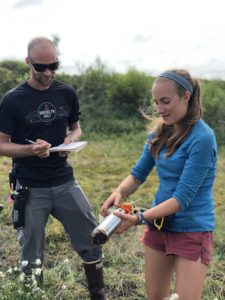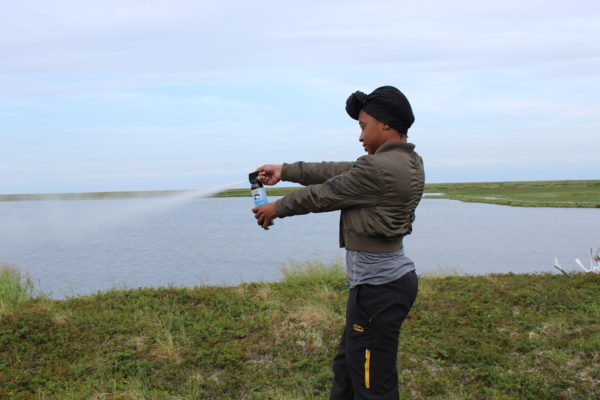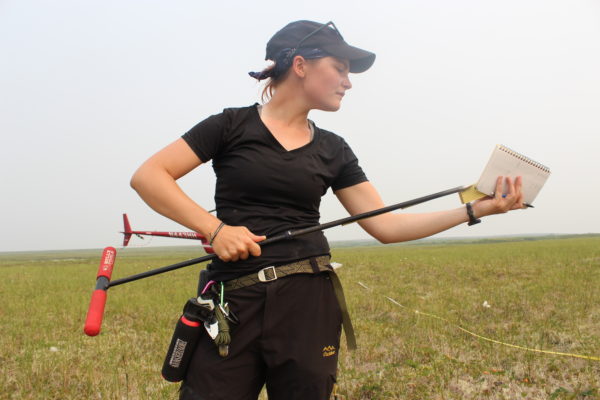 As our time at the Polaris Project field camp in the YK Delta comes to an end, I’ve been reflecting on the past two weeks a lot. My knowledge of the Arctic tundra has increased exponentially since the first day we walked around camp observing the microtopography, cracking earth, soft moss patches, and numerous small lakes. My scientific knowledge has also increased significantly. I’ve spent most of my time measuring the rate of methane gas emissions from cotton grass in fens, but have also had the opportunity to go out and assist my peers as they measure nutrients released from cracks in the earth, gas released into the atmosphere from lakes, and other interesting projects.
As our time at the Polaris Project field camp in the YK Delta comes to an end, I’ve been reflecting on the past two weeks a lot. My knowledge of the Arctic tundra has increased exponentially since the first day we walked around camp observing the microtopography, cracking earth, soft moss patches, and numerous small lakes. My scientific knowledge has also increased significantly. I’ve spent most of my time measuring the rate of methane gas emissions from cotton grass in fens, but have also had the opportunity to go out and assist my peers as they measure nutrients released from cracks in the earth, gas released into the atmosphere from lakes, and other interesting projects.
What stands out to me the most about all of our projects is the intimate and intricate connections between each of our research projects. While incredibly diverse, the ecosystems of the Arctic tundra are also all tied together. The complex network of systems and processes that characterizes this place is apparent in the relationship between all of our projects. Despite reading scientific papers about this landscape prior to Polaris, I truly was not prepared for the incredible diversity and nuance that characterizes the Arctic tundra and have enjoyed learning more about this place every day.
My own research project has developed along with my knowledge of this place. Ten days ago I had never heard of an LGR and now I feel both competent and confident using (and troubleshooting) this piece of equipment that we use to measure gas flux. I can take an aquatic sample kit in less than twenty minutes, I can navigate to different sample sites despite the lack of large topographical features in this landscape to serve as guides, and I feel comfortable asking questions about methods and thinking critically about how to design an experiment that considers spatial, temporal, and other heterogeneity.
Beyond the science, I am loving living at a remote field camp and am loving being in the tundra. I haven’t thought much about life beyond our little peninsula for the past two weeks because I’ve been so engaged in exploring this place and connecting with the people here. From rousing games of dice and cards to getting up before 5am to watch the sun rise after just grazing the horizon to staying up well into the night talking (because the sunlight just never really goes away), field camp is a world of its own that is exciting, novel, energizing, and thought-provoking. And the engaging conversations, games, and fun extend to our days spent away from camp collecting samples and data when we are taking breaks to pick the quickly ripening cloudberries near our sample site or asking our mentors for career advice while hauling equipment between sites.
While excited for the next stage of the Polaris Project back at Woods Hole Research Center, I also know that leaving the little peninsula that we’ve called home for the past two weeks will be hard. I have loved living in such a dynamic, extreme, and unique landscape. In the two weeks we have been here, we have experienced a wide range of temperatures, noticed changes in vegetation, observed the impact our brief existence here has had on this environment, and been astonished by the incredible amount of variation across the different areas we’ve visited. I think it will be hard to articulate the protean nature of the Arctic tundra to friends and family because it truly is a world of its own, but I’m excited to share my experience and I’m also excited to analyze my data and begin to think about how to communicate it in a clear and meaningful way.
— Anneka Williams is a student at Bowdoin College



